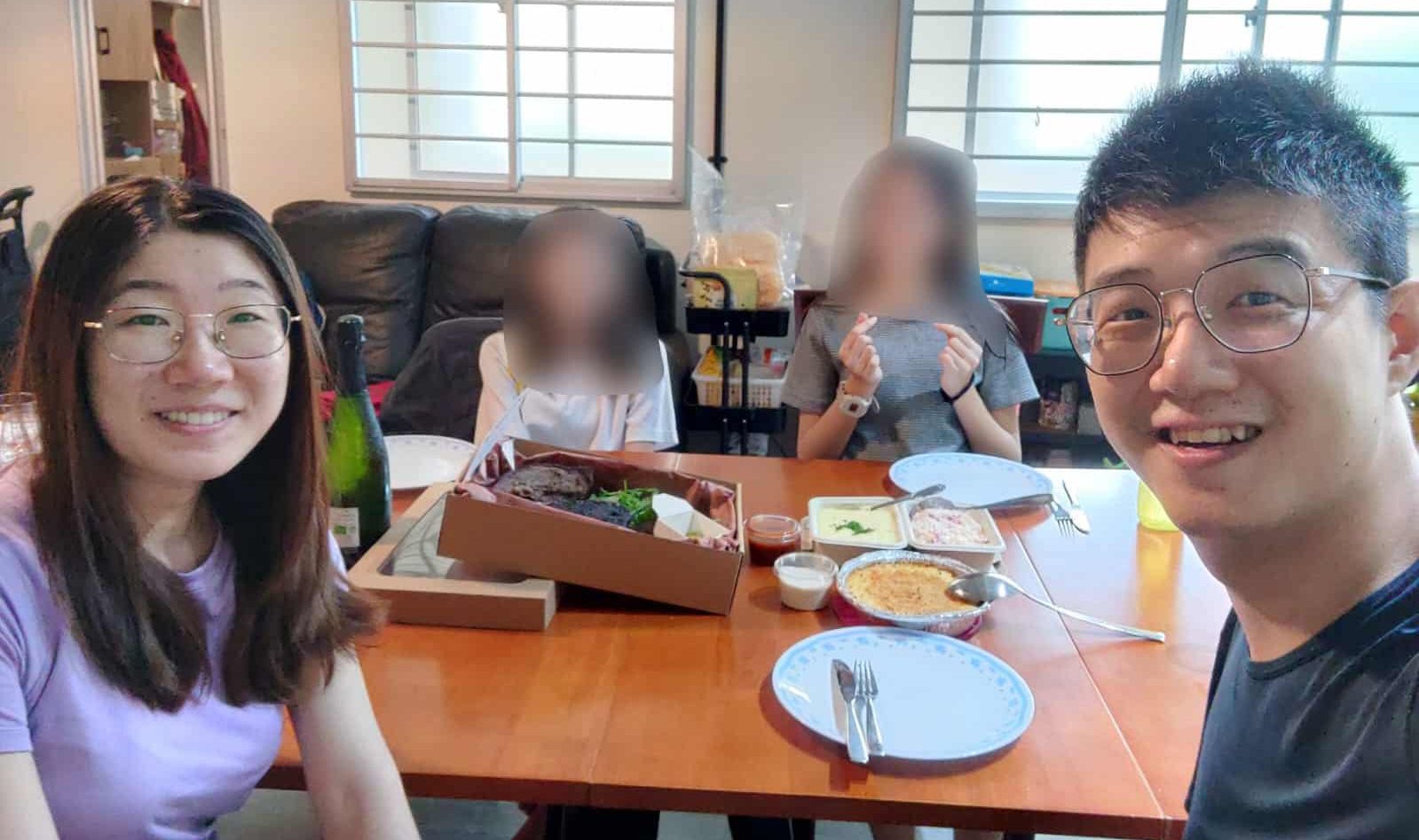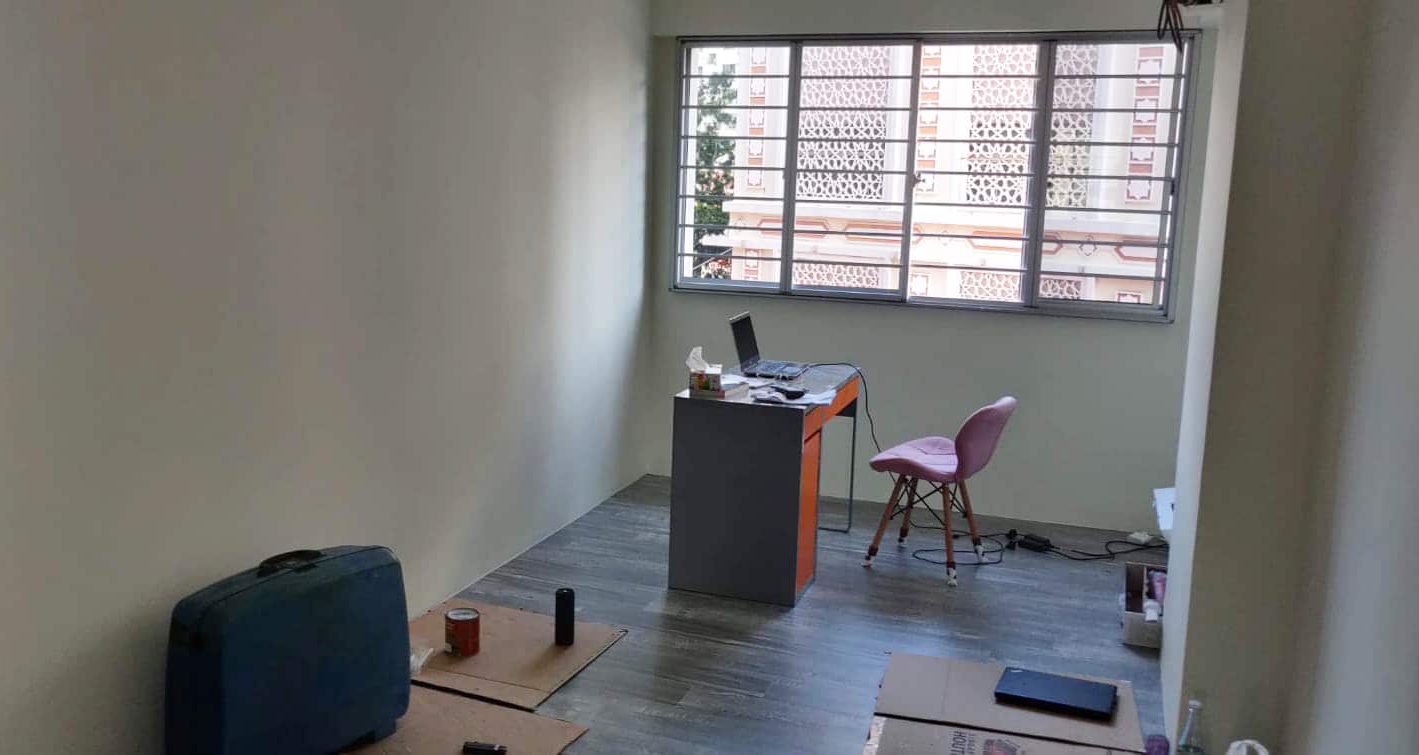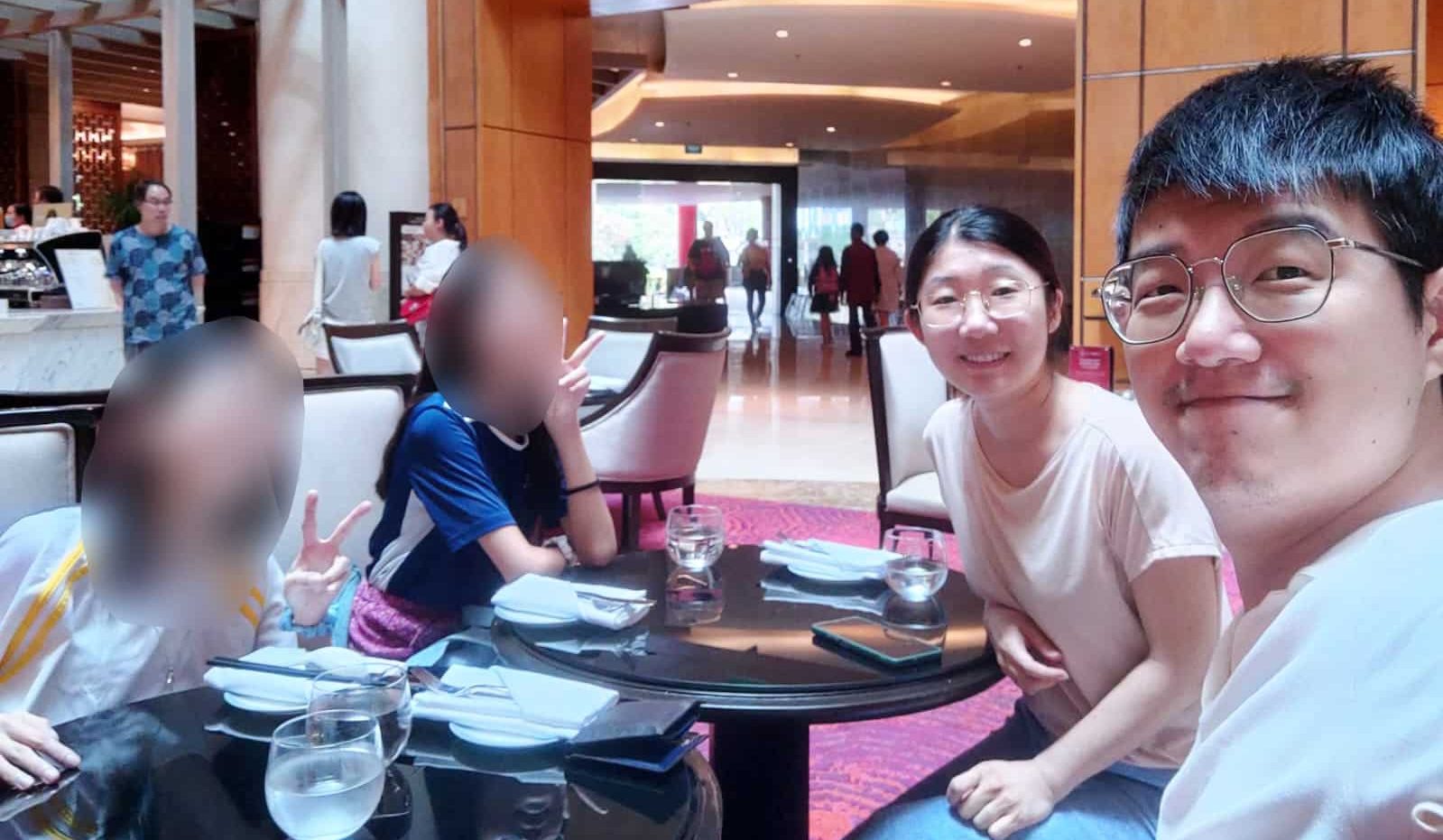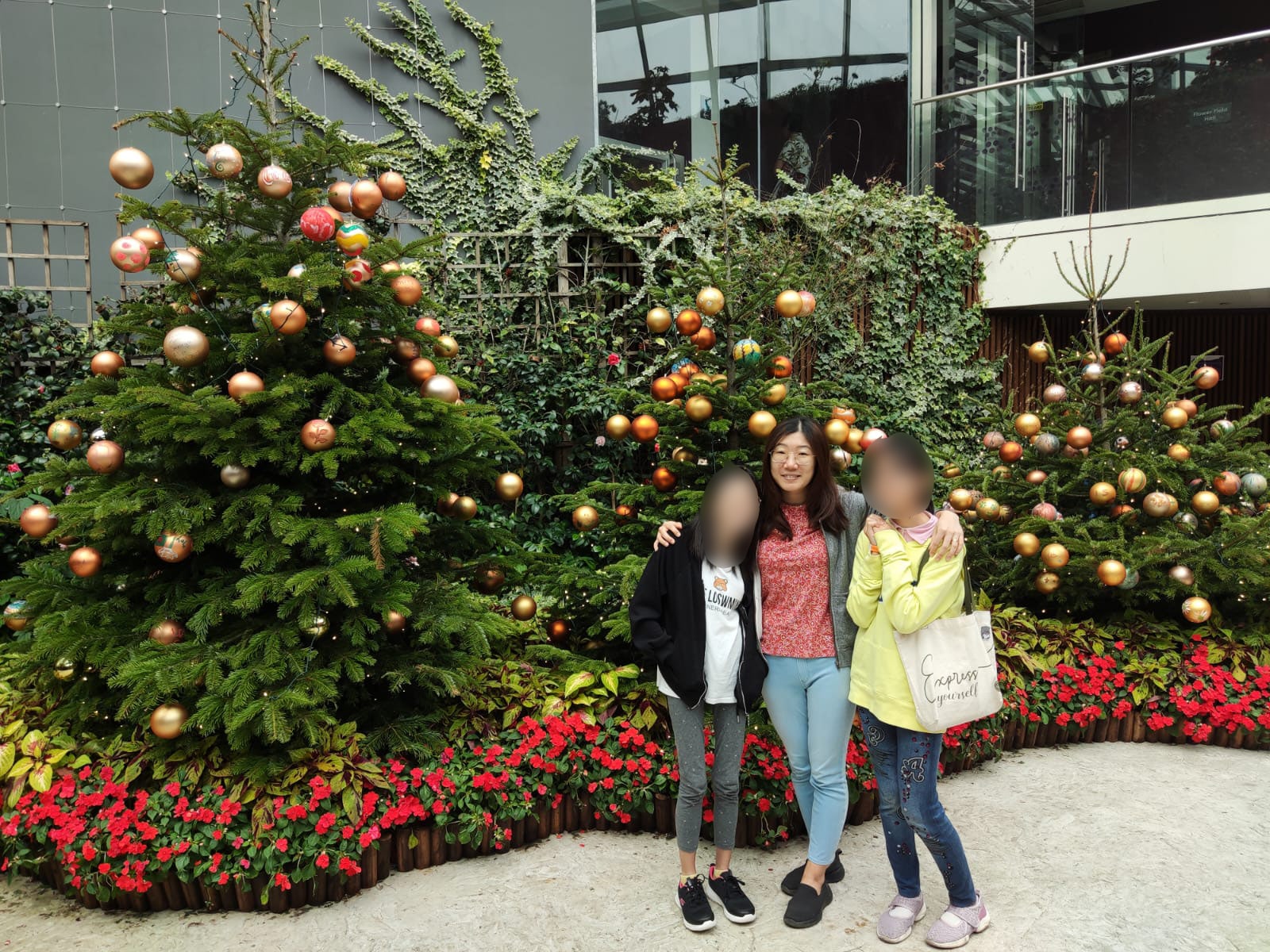Heartbroken by children in need, this young couple opened their home and became foster parents
by Gracia Chiang // November 4, 2024, 12:39 pm

The journey of fostering has brought heartache, but it has also helped them to know God's heart more. All photos courtesy of Renfred Loh and Monica Zheng.
As a DINK (double income, no kids) couple, Renfred Loh, 35, and Monica Zheng, 34, could be having cosy date nights or enjoying impromptu getaways during their downtime, but they have chosen a different kind of life.
Over the last three years, they have been foster parents to four children. Instead of choosing to take in younger kids, which many foster parents prefer, the couple have also opened their home to youth.
Currently foster parents to a 12-year-old who has been living with them for two years, they have also fostered three teenagers who stayed with them anywhere from two months to a year.
“We both feel very strongly that we are called to take care of the next generation. And, if possible, to bring them up in the way of the Lord whether it’s our own children or any children,” shared Renfred.
“For us, we have a home and a space, so this is one of the ways we can respond.”
“In fostering, the children also come from less privileged, very unstable or sometimes even unsafe backgrounds. So we think it’s quite meaningful to hold them with the hope that they can be reconciled with their family,” he explained.
“You’re holding space; you’re hoping that the natural family stabilises. That’s also part of God’s work – to see reconciliation.”
How the burden came about
Going back to how it all first started, one can trace God’s hand in all of this.
Born in China, Monica had mostly lived in Australia before moving to Singapore at age 24. Renfred, on the other hand, was born and bred here.
However, their paths crossed when the two of them were studying at Singapore Bible College in 2016.
While dating, both also came across the idea of opening their home to those in need.
Having heard one of his seminary professors talk about a personal experience with fostering, Renfred was intrigued.
After listening to a couple share about a similar experience at a conference, something also stirred in Monica’s spirit.
“I felt that this is something I would love to do in the future, and I knew that Renfred would want to do that too,” she said.

Although Renfred and Monica were aware of fostering since 2016, it would be four years later before they would have their own home.
The time finally came after they were married and secured their own place.
“We moved in the day before the circuit breaker. It was really God’s grace,” noted Monica.
“We were still sleeping on the mattress in the living room because our furniture was not delivered yet. One day before circuit breaker, they were still cleaning and trying to finish up our house.”
Recalling how God provided this 4-room HDB flat for them, Monica added: “Renfred found this listing online, but it looked really bad because it was so run-down and didn’t look liveable.
“However, when we saw it, we liked the size and shape of the space. We thought we would give an offer, and if they accepted, we would take it.
“It was such a blessing. Who knew that a few months later Covid-19 would hit, everything would be locked down and prices of housing would rise quite a lot?”

When the couple first moved in, this was how their study room looked like. The circuit breaker gave them some time to settle down and furnish their flat.
Renfred also revealed that they had just enough to afford the house, especially since they could only rely on his salary as a church worker as Monica was not a Singapore Permanent Resident then.
“We see that our home is given by God. It’s really His home actually,” he underscored.
“So we will always remember that what we have comes from God, and we should continue to use it for Him and His kingdom’s purposes.”
Opening their doors
True to their desire to offer a safe haven to others, that is exactly what the couple did once the circuit breaker lifted.
When a pastor reached out to them about a youth who was staying in a one-room rental flat and required a more conducive place to study, they opened their home to her for three or four months.
The next year, they also took in a boy who had a strained relationship with his mother and needed a place to stay for a few months.
“Even when we had the boy, Monica would mention about fostering once a while. Around that time, there was also a big push for fostering and we would see it come up in Facebook ads,” said Renfred.
After watching a local documentary on child protection work, both were also heartbroken by the needs of vulnerable children.
“We are not called to just know God’s heart, but also follow God’s heart.”
“Every time Monica watched it, she would cry. One night I just felt, ‘Let’s stop talking. Let’s just do,’” quipped Renfred.
Though it was late and they were already lying in bed with the lights off, they got up, filled in the form and submitted it.
“In our relationship, Renfred is the doer and I’m the talker,” admitted Monica sheepishly.
Pointing out that all it takes is just to make a decision, Renfred said: “Sometimes we want a key moment to strike us to do something, but the moment can be any moment. Today can be the day.”
As Christians, many of us know that God cares for orphans, widows and the least in society, but “we are not called to just know God’s heart, but also follow God’s heart”, he emphasised.

The couple tied the knot in 2018 after two years of dating. Both of them are ministry staff at Hebron Bible-Presbyterian Church.
Not long after their application to be foster parents was processed, Renfred and Monica were asked if their house was available for a girl who needed short-term accommodation.
Originally from Malaysia, the teenager was living in Singapore with her father due to the border closure. However, he was unable to care for her.
“She was very manageable,” said Monica. “The only thing is that she had diabetes, so we were more stressed by what she could eat because we didn’t want to feed her something wrong.”
Their first foster child stayed with them for six months until the land borders between Singapore and Malaysia re-opened in 2022.
“It’s not always a happy reunion or result.”
“That was really nice. It’s our only case where the child has reunited with their family. That was really precious,” said Monica.
Noting that such reconciliation is not possible for all foster children, Renfred added: “It’s not always a happy reunion or result in that sense. When we first started fostering, this was our goal. But the reality is that not every child can have that.”
He also pointed out that because of the growing number of children in need, many are unable to find foster families.
And as tweens and teens are more independent, they are more likely to be the ones placed in institutionalised care.
“That’s not ideal because of the ratio of kids to adult carers, and it’s not the same as a family environment. That’s the reality we’re facing. It’s quite sad.”

While they started off only fostering only one child, Renfred and Monica made space in their home so that they could open up their doors to more children.
A few months later, the Lohs received another enquiry from a social worker asking if they could take in two teenagers immediately.
Just like their first child, these girls needed a home urgently because of a foster placement breakdown.
When breakdowns happen, this can be due to various reasons such as a change of circumstances in the foster home or relationship dynamics.
“We got the call at 4pm and by 7.30pm they came,” said Renfred.
Amazed at the timing of the request, Monica said it was divine as they had just recently completed a remodelling of their guest room to accommodate two children.
“The room is quite big, so we thought maybe we could help more children,” said Monica.
Having already changed out their single bed to a double-decker and ceiling fan to a wall fan, there was only some cleaning up and tidying to do before their foster children arrived.
Because the girls were aged 15 and 16, they were also quite independent.

The 16-year-old ended up staying longer with the couple. She is pictured here with their current foster child who came at 10 years old.
While the couple would usually prepare their meals, their foster children could travel to and from school by themselves, as well as be left alone at home for short periods of time.
“That gave us more flexibility,” shared Monica.
As the couple have full-time jobs as church ministry staff, there are occasions when both have to be out for meetings.
“We didn’t know if we had the bandwidth to look after someone young, so when we were given an age range for foster children, we started with six years old and above, up to teens.”
While the placement was supposed to be for only two weeks, one child stayed for two months and the other, a year.
“If the time they have spent with us has made an impact, that’s enough for me to be content.”
“There were not any big issues that came up for the child who was with us for two months. But the other was quite unhappy staying at our place by the end of the one-year mark,” said Monica.
“We tried to reason with her, but we weren’t able to get through to her. She eventually asked to move to another home. This was a case where it was a foster placement breakdown, but we don’t take it personally.”
As for the uncertainty that comes with fostering, including the length of stay of every child, Monica said: “I don’t struggle with saying goodbye to people. To me, I see it as different seasons – there are different people who come into your life and go.
“If the time they have spent with us has made an impact in some way, that’s enough for me to be content.”

Monica at Gardens by the Bay with their third and fourth foster child.
Echoing her sentiment, Renfred shared that children – even biological ones – are not the property of parents. They ultimately belong to God who loves them infinitely more.
“As parents, we hold them like this instead of like this,” said Renfred, opening his hand with his palm facing up before clenching his fist.
“God is the one who puts them in our hands; God is the one who can take them away. But even then, there are bonds and memories built.”
Trusting that God is the one who is in control of what happens to each child, Monica remarked: “Their life is in God’s hands. There’s really only so much we can do.
“But it’s God that changes and transforms their life. Just seeing that growth – we’re thankful for that.”
From trauma to transformation
In the two years their current foster child has been with them, the couple has indeed bore witness to the difference a family environment can have.
“She’s the youngest one we’ve ever had, but also the one with the most trauma,” said Monica.
“She also has a heavy sense of rejection, first and foremost from her biological family and, to some extent, the foster placements as well. She had been in two foster homes before us.”
In the first week of her arrival, there was a different trigger every other day.
“That caused conflict and miscommunication, so there were many things we had to resolve. It was very tiring,” recalled Monica.
“When children keep getting abandoned, they keep thinking that the problem is them.”
The adjustment was also complicated by the fact that their 16-year-old was still staying with them at that time.
Grateful for the helpful parenting tips they received, Monica said that they reached out to their foster child’s social worker after feeling like they were burnt out.
“I can’t say it immediately got better. It took time, but we eventually learnt what was going on with her and how to communicate with her.”
Sharing that they have seen many positive changes in their foster daughter, Monica said: “She’s more resilient and less sensitive to remarks now.”
As the more playful parent, Renfred’s jokes have also lightened up the mood at home.
“When children keep getting abandoned, they keep thinking that the problem is them,” he observed.

Making memories: The couple on an outing to Universal Studios Singapore with their foster children.
While their foster child used to be anxious about people having a negative view of her and affected by the opinions of others, this is less of an issue now.
Her self-esteem and social skills have also improved.
For instance, she used to prefer being in a corner and not interacting with others in church, but now has friends that she sits with.
“She came here knowing about Jesus and we were able to walk with her,” said Renfred.
“Nowadays she also says all the people in church are very warm and welcoming. I don’t think it’s the people who have changed. It’s her perception of people.
“This also shows that as parents, we’re very powerful in shaping perception, in helping children see the world.”
Having journeyed with their foster child through the recent Primary School Leaving Examination, the couple are also heartened at how far she has come.
“At first, we spent more time explaining to her why she should study rather than studying itself. But at the end of Primary 5, she said she needed help. It was self-motivated,” said Renfred.
“It’s always more about the principles, and the principle we want to teach her is hard work pays off.”
Seeing lives changed
At the end of the day, it is not just the child’s life that has been transformed but also their own.
For instance, Monica said that fostering has helped her reflect on her own limitations and encouraged her to rely more on God.
“I thought I was a pretty patient, loving and good person, but I realised that I can be so human and fleshly,” she confessed.
“Very often I’m praying, ‘God please give me more patience and love. I just can’t pull it out.’
“It’s recognising that ‘God, I need you, I can’t do this on my own.’ There’s still a lot of room for growth and learning.”
During times when things are difficult, Monica has also learnt to take a step back and remember the purpose of fostering.
“We may not be able to give them a lot, but seeing how much of a difference a safe space makes to a child helps me to keep doing it.”
“There are a lot of children out there who really need a loving home.”
Renfred also points out how parenting has strengthened their marriage through the deeper conversations they have had.
“We understand each other more – why we make certain decisions,” he said.
Agreeing, Monica elaborated: “What’s going to be the consequence of this action? How do we communicate that to the child? How do we enforce this? We have to discuss and make sure we’re aligned.”
Surmising why some foster parents might be worried about taking in older children, Renfred said they might feel that it is easier to exercise authority over younger kids.
“For teenagers, you’re more of an advisor,” he said. At that age, they may also talk back or display rebellious attitudes more often.
“But these things are a normal part of parenting. The reality is that all of us were also once teenagers. We all gave our parents that kind of headache and heartache.”
“I’ve also been reminded of God’s heart for us. He’s always loving and always perfect, but I’m not. I’m imperfect; I’m also growing. So just as God has been gracious to me, I hope I can be more gracious towards (my child),” said Renfred.

Marriage and parenting are crucibles of growth, shared Renfred.
Although the couple does not have any biological children, they are open to that possibility.
“We don’t feel like there’s a need to have our own children, but if God blesses us, we’ll have them,” said Monica.
Highlighting that there are already many needs in the world, Renfred concluded: “There are a lot of children out there who really need a loving home, who need Jesus in their lives.
“Some of my friends ask me, ‘Do I miss late-night suppers and overseas trips?’ Ya, to some extent. But what’s the benefit of those in the light of eternity or the impact you can make in a child’s life?
“When we look back at our own lives, it’s worthwhile and purposeful – this counts for something.”
Have a heart for vulnerable children and families?
To commemorate Orphan Sunday in Singapore (November 10, 2024), World Without Orphans – Southeast Asia and Home for Good, Singapore have come together with various partners to organise a series of events.
These include:
- A 13-day devotional (November 1–13)
- Orphan Sunday services (November 10)
- A Worship & Prayer Night (November 11)
- Roundtables for churches and organisations (November 12-13)
To find out how you can join in, click on the links above for more details.
World Without Orphans is a global movement whose mission is to call and equip national leaders to collaborate in solving their own country’s orphaned and vulnerable children’s crisis.
Home for Good, Singapore is a registered charity that supports a network of foster parents, adoptive parents and volunteers who are passionate about helping vulnerable children, youth and families from all backgrounds.
RELATED STORIES:
Building a “home” for youths in the streets and sports courts of Henderson estate
How a victim of childhood abuse found the healing to minister to others in Thailand
Cheated of money, cheated in love, yet this foreign domestic helper chose to forgive
We are an independent, non-profit organisation that relies on the generosity of our readers, such as yourself, to continue serving the kingdom. Every dollar donated goes directly back into our editorial coverage.
Would you consider partnering with us in our kingdom work by supporting us financially, either as a one-off donation, or a recurring pledge?
Support Salt&Light


